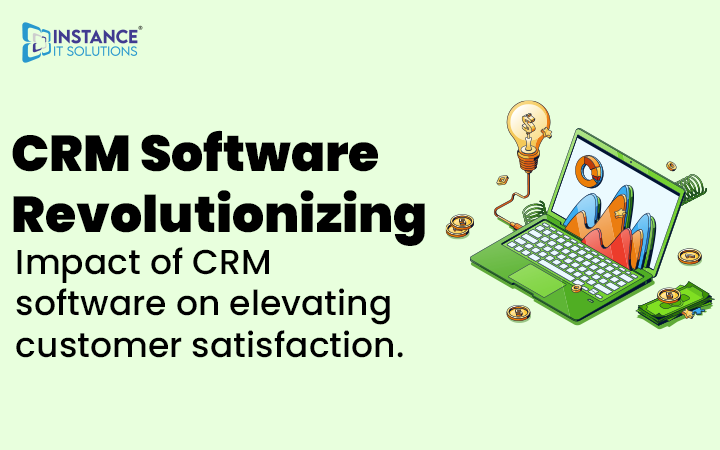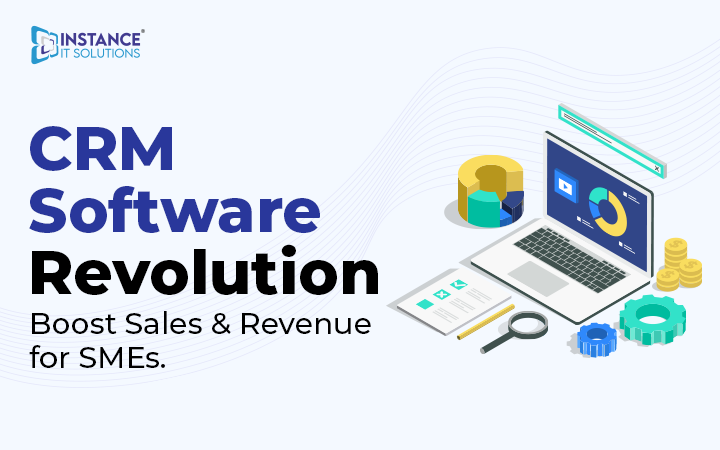Benefits of CRM Software: Impact of CRM in Increasing Customer Satisfaction
-

-
Shivendra Saxena
09 Apr, Tue
Content

introduction
In the dynamic landscape of modern business, Customer Relationship Management (CRM) software has emerged as a pivotal tool for organizations seeking to enhance their customer-centric approach. This introduction aims to provide a brief overview of CRM software, underscore the importance of customer delight in contemporary business strategies, and explore the revolutionary impact of CRM software on elevating customer satisfaction. Â
CRM software is a technological solution designed to streamline and optimize an organization's interactions with its customers. It encompasses a range of applications and tools that facilitate the management of customer data, communication channels, and sales processes. Partnering with a reputable CRM Software Development Company can ensure tailored solutions that align with specific business needs and objectives. By leveraging expertise in software development, such companies can create customized CRM solutions that enhance efficiency, improve customer satisfaction, and drive business growth. Â
By consolidating customer information in a centralized database, CRM software enables businesses to better understand their customers, anticipate their needs, and ultimately build more meaningful and lasting relationships. Customer delight, surpassing mere satisfaction, has become a strategic imperative in today's competitive business environment. Satisfied customers may stay loyal, but delighted customers become advocates for a brand, contributing to positive word-of-mouth, repeat business, and increased customer lifetime value.  Â
Organizations are increasingly recognizing that exceeding customer expectations is not just a nice-to-have but a key driver for sustainable success. The integration of CRM software into business operations has revolutionized how organizations approach customer satisfaction.Â
CRM systems empower businesses to track and analyze customer interactions across various touchpoints, enabling them to tailor products and services to individual preferences. This personalized approach, coupled with efficient communication and timely response capabilities, fosters a sense of trust and satisfaction among customers.Â
Understanding Customer Delight
Customer delight refers to exceeding customer expectations by delivering exceptional experiences that evoke positive emotions and foster long-term loyalty. It goes beyond mere satisfaction, aiming to surprise and delight customers at every interaction.Â
In today's competitive landscape, where customer experience is a key differentiator, achieving delight is paramount for sustaining business success. Customer delight directly correlates with business success, as delighted customers are more likely to become loyal advocates who promote the brand, driving positive word-of-mouth referrals, repeat purchases, and increased profitability.Â
Traditional approaches to customer delight include personalized interactions, proactive problem-solving, and consistent delivery of high-quality products and services to create memorable experiences for customers.Â
Evolution Of CRM Software
CRM software has its roots in the 1980s and 1990s with the advent of database marketing and contact management systems. These early systems focused on organizing customer data and facilitating communication with customers through basic functionalities.Â
Early CRM systems faced challenges such as limited functionality, disjointed data silos, and difficulty in integrating with existing business processes. Organizations struggled to harness the full potential of customer data and provide personalized experiences due to these limitations.Â
Choosing the right CRM software for your business needs is crucial. Modern CRM solutions have evolved to address these challenges by offering comprehensive platforms that centralize customer data, automate processes, and provide actionable insights. Cloud-based CRM systems, AI-powered analytics, and seamless integrations with other business tools have transformed CRM into a strategic asset for enhancing customer relationships and driving business growth.
Key Features of CRM Software
CRM software excels in managing customer data by centralizing information from various touchpoints, including interactions, transactions, preferences, and demographics. This comprehensive view enables businesses to understand their customers better and tailor their strategies accordingly. The systems track customer interactions across multiple channels such as email, phone calls, social media, and website visits.Â
This feature ensures that every interaction is logged, providing a complete history of customer engagements for reference and analysis. It automates repetitive tasks such as data entry, email responses, and appointment scheduling. By streamlining these routine activities, employees can focus on more value-added tasks while ensuring consistent customer communication.Â
CRM solutions offer personalization features that enable businesses to customize communications and offerings based on individual customer preferences and behavior. This personalized approach enhances customer experience and fosters stronger relationships.Â
They provide robust analytics and reporting capabilities that allow businesses to gain insights into customer behavior, trends, and performance metrics. By analyzing this data, organizations can make informed decisions, identify areas for improvement, and measure their strategies.Â
Enhancing Customer Engagement
CRM software facilitates real-time communication with customers through various channels such as live chat, instant messaging, and chatbots.Â
Real-time communication ensures quick responses to customer inquiries, addressing concerns promptly, and providing personalized support. Integration with social media platforms enables businesses to engage with customers where they are most active. CRM systems gather data from social media interactions, allowing organizations to track customer sentiment, respond to feedback, and create targeted marketing campaigns based on social media insights.Â
CRM software enables organizations to provide a seamless omnichannel experience, where customers can interact with the brand consistently across multiple channels such as email, phone, website, social media, and in-person interactions. This integrated approach ensures a cohesive and personalized customer journey regardless of the channel they choose.Â
CRM systems analyze customer data to segment audiences and create targeted marketing strategies. By understanding customer preferences, behaviors, and purchasing patterns, businesses can tailor marketing messages and offers to resonate with specific customer segments, increasing the effectiveness of their campaigns and enhancing engagement.Â
Streamlining Sales Processes
CRM software streamlines lead management by capturing, organizing, and tracking leads throughout the sales pipeline. It enables sales teams to prioritize leads, assign follow-up tasks, and track interactions, ensuring efficient lead nurturing and maximizing conversion.Â
They utilize historical data and current sales metrics to generate accurate sales forecasts. By analyzing past performance, identifying trends, and predicting future sales, organizations can make informed decisions regarding resource allocation, goal setting, and strategic planning.Â
CRM software provides insights into customer behavior and preferences, enabling sales teams to tailor their approach and messaging to individual leads. By understanding customer needs and addressing pain points effectively, organizations can increase conversion rates and drive more successful sales outcomes.Â
CRM systems play a crucial role in customer retention by facilitating personalized interactions, tracking customer satisfaction levels, and identifying opportunities for upselling or cross-selling. By nurturing existing customer relationships and providing ongoing support, organizations can enhance customer loyalty and maximize lifetime value.Â
Improving Customer Service
CRM software often includes ticketing systems and case management functionalities to efficiently handle customer inquiries, complaints, and requests. These systems streamline the process of logging, assigning, and tracking customer issues, ensuring timely resolution and effective communication.Â
CRM systems integrate with knowledge bases to provide agents with access to comprehensive information and resources needed to address customer inquiries promptly.Â
By centralizing knowledge and best practices, organizations can empower agents to resolve issues efficiently and provide accurate, consistent support. It enables proactive issue resolution by monitoring customer interactions and identifying potential issues before they escalate.Â
Through automated alerts and predictive analytics, organizations can anticipate customer needs, address concerns proactively, and prevent problems from arising.Â
CRM systems facilitate the collection and analysis of customer feedback to measure satisfaction levels and identify areas for improvement. Through surveys, ratings, and sentiment analysis, organizations can gather valuable insights into customer perceptions, track satisfaction metrics, and continuously enhance their service delivery.Â
Challenges And Solutions
Implementing CRM software can pose several challenges, including resistance to change, data quality issues, inadequate user training, and integration complexities. Resistance from employees, insufficient understanding of CRM benefits, and issues related to data accuracy and consistency are among the common hurdles organizations face during implementation.Â
Securing leadership buy-in and ensuring clear communication about the benefits and purpose of CRM can address resistance and foster a positive attitude toward implementation. Providing extensive training for users at all levels helps overcome challenges related to unfamiliarity with the system. Training programs should cover not only technical aspects but also emphasize the strategic benefits of CRM.Â
Establishing robust data quality management processes, including data cleansing and validation, ensures that the CRM system operates with accurate and reliable information. Breaking down the implementation process into manageable phases allows organizations to address specific issues incrementally, reducing the overall complexity and risk.Â
Careful planning for integration with existing systems is crucial. A well-thought-out integration strategy ensures smooth data flow between CRM and other business applications. Continuous improvement is vital for CRM success. Regularly updating the CRM system to incorporate new features, address emerging challenges, and stay aligned with evolving business needs ensures its long-term effectiveness.Â
Additionally, organizations should gather feedback from users, analyze performance metrics, and adapt strategies to enhance the CRM implementation continually.Â
Future Trends In CRM
The Future Trends and Technologies of CRM in 2024 are poised to revolutionize customer relationship management. Leveraging artificial intelligence (AI) and machine learning (ML) will be pivotal in enhancing customer insights and interactions. AI-powered CRM systems will analyze vast amounts of customer data to identify patterns, predict behavior, and personalize interactions at scale. Meanwhile, ML algorithms will automate routine tasks, improve sales forecasting accuracy, and offer proactive customer service.
Moreover, CRM software will increasingly integrate with emerging technologies such as augmented reality (AR), virtual reality (VR), Internet of Things (IoT), and blockchain. These integrations will enable more immersive and interactive experiences, seamless connectivity across devices, and enhanced security and transparency in data management.
In essence, the future of CRM lies in harnessing the power of AI, ML, and emerging technologies to create more intelligent, personalized, and impactful customer relationships.
These integrations will enable enhanced customer experiences, such as immersive product demonstrations, personalized IoT-driven interactions, and secure, transparent transaction records. In the future, CRM software will evolve into comprehensive platforms that not only manage customer relationships but also orchestrate end-to-end customer experiences.Â
These platforms will offer seamless integration with various business systems, advanced AI-driven analytics, and enhanced automation capabilities. CRM will continue to shift towards cloud-based solutions, ensuring scalability, flexibility, and accessibility for all businesses.Â
Conclusion
Throughout this exploration, we have witnessed the transformative impact of CRM software on modern businesses. From its historical roots to its evolution into sophisticated platforms, CRM has revolutionized how organizations manage customer relationships, enhance customer experiences, and drive business growth. It is evident that embracing CRM software is essential for businesses aspiring to achieve customer delight in today's competitive landscape.Â
By centralizing customer data, enabling personalized interactions, and fostering proactive engagement, CRM empowers organizations to exceed customer expectations, build lasting relationships, and drive sustainable success. Looking ahead, the future of customer relationship management holds immense promise. With advancements in artificial intelligence, integration with emerging technologies, and a relentless focus on customer-centricity, CRM software will continue to evolve as a strategic asset for businesses. In conclusion, CRM software stands as a cornerstone for businesses seeking to thrive in an increasingly customer-centric world.Â
In case you are looking to imbibe a CRM system in your business operation, Get In Touch with Instance IT Solutions right away. We can help you with our outstanding customized solutions. Â
We are trusted by over 650+ clients.
Join them by using our services and grow your business.
Request a callbackRequest a callback



 Contact Us
Contact Us
